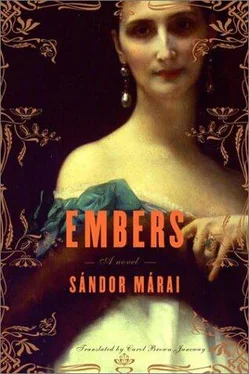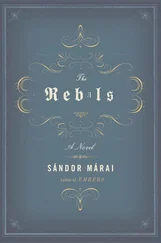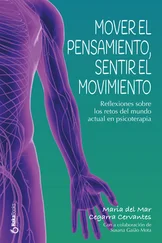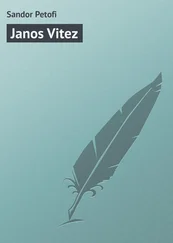With his memories, so that he will not allow solitude and time to cloud his sight and weaken his hea rt and his soul. There is one duel in life, fought without sabers, that nonetheless is worth preparing for with all one’s strength. And it is the most dangerous. And one day the moment comes. What do you think?” he asks courteously.
“I quite agree,” says the guest, and looks at the ash of his cigar.
“I’m so glad you take the same view,” says the General. “The anticipation keeps one alive. Of course, it, too, has its limits, like everything in life. If I hadn’t known that you would come back one day, I would have probably set out myself to find you, in your house near London or in the tropics or in the bowels of hell. You know I would have come looking for you. Clearly one knows everything of real importance, and-you’re right-one knows it without benefit of radio or telephone.
Here in my house I have no telephone, only the steward has one down in the office, nor do I have a radio, as I have forbidden any of the stupid, sordid daily noise of the outside world in the rooms where I make my home.
“The world holds no further threat for me. Some new world order may remove the way of life into which I was born and in which I have lived, forces of aggression may foment some revolution that will take both my freedom and my life. None of it matters. What matters is that I do not make any compromises with a world that I have judged and banished from my existence. Without the aid of any modern appliances, I knew that one day you would come to me again. I waited you out, because everything that is worth waiting for has its own season and its own logic. And now the moment has come.”
“What do you mean by that? Asked Konrad. “I went away, which was my right. And it might be said I also had just cause. It is true that I went away without forewarning and without farewell. But I am sure you sensed and understood that I had no choice, and that it was the right thing to do.” “That you had no choice?” says the General, glancing up.
His eyes are blade-sharp and they reduce his guest to the status of an object. “That is the heart of the matter. I have been breaking my head over it for a considerable time now. Forty-one years in fact, if I am not mistaken.”
And, because the other man remains silent, “Now that I am old, I spend a lot of time thinking about my childhood. Apparently this is normal. One remembers the beginning more clearly, the closer one comes to the end. I see faces and I hear voices. I see the moment when I introduced you to my father in the garden of the academy. Because you were my friend, he accepted you as his. He was not a man who was quick to accept someone as a friend, but once he gave his word, it was for life. Do you remember that moment? We were standing under the chestnut tree at the great entrance, and my father gave you his hand. ‘ are my son’s friend,’ he said. ‘ must both honor this friendship,’ he added earnestly. I think nothing in life was as important to him as this. Are you listening to me? … Thank you. I want to tell you what happened, and to make sure I get it all in the correct order. Please do not worry, the carriage is waiting and will take you back to town whenever you would care to leave.
And do not be concerned that you might have to sleep here even if you don’t wish it. I could imagine that this might be uncomfortable for you.
But of course if you would care to do so, you can spend the night,” he adds. And as the other makes a gesture of refusal: “As you wish. The carriage is outside. It will take you back to town and in the morning you can set off for your house near London, or the tropics, or wherever you choose. But before then I ask you to listen to me.” “I am listening,” says the guest.
“Good,” answers the General in a lighter tone of voice. “We could also talk of other things. Two old friends on whom the sun is setting have much to remember. However, since you are here, let us speak only of the truth. So: I have begun by reminding you that my father accepted you as his friend. You know exactly what that signified to him, you knew then that any person to whom he had given his hand could count on him, no matter what blows of fate, or suffering, or need, life brought. He did not often give his hand, it is true, but once done it was without any reservation. That was how he gave you his hand in the courtyard of the academy under the chestnut trees. We were twelve years old, and it was the last moment of our childhood. Sometimes at night I see him with absolute clarity, the way I see everything really important. To my father, friendship meant the same as honor. You knew that, because you knew him. And allow me to tell you that it may have meant even more to me. Forgive me if what I am telling you makes you uncomfortable,” he says softly, almost affectionately.
“I am not uncomfortable,” says Konrad, just as softly. “Tell me.” “It would be good to know,” the General says, as if debating with himself, “whether such a thing as friend ship actually exists. I do not mean the opportunistic pleasure that two people experience in encountering each other when they think the same way about certain things at certain moments of their lives, when they share the same tasks or the same needs. None of that is friendship. Sometimes I almost believe it is the most powerful bond in life and consequently the rarest. What is its basis? Sympathy? A hollow, empty word, too weak to express the idea that in the worst times two people will stand up for each other. Or perhaps it’s something else … perhaps buried deep in every relationship between two people is some tiny spark of erotic attraction. Here alone in the forest, trying to make sense of life, I thought about that now and then. Friendship, of course, is quite different from the affairs of those driven by morbid impulses to satisfy themselves in some fashion with others of the same sex. The eros of friendship has no need of the body … That would be more of a disturbance than an arousal. And yet, it is eros all the same. Eros is present in love just as it is present in every mutual relationship. You know, I have done a great deal of reading,” he says, as if to excuse himself. “These days such things are written about much more freely. But I have also repeatedly reread Plato, because in school I wasn’t yet ready to understand him.
Friendship, I thought-and you who have seen the world certainly know this better than I do alone here in my village-is the noblest relationship that can exist between human beings. And it is interesting that it also exists among animals. Animals are capable of friendship, selflessness, and the desire to help others.
“A Russian prince-I’ve forgotten his name-has written about it. Lions, grouse, all sorts of creatures of every species have apparently come to the aid of others of their breed in trouble, and I’ve seen this for myself even when the animals are completely unrelated. Did you ever witness something of the kind on your travels? … Friendship out there must surely be different, more advanced, more contemporary than it is here in our backward world. Kindred species organize mutual assistance.
… Occasionally they have to struggle desperately against the obstacles they encounter, but there are always strong members in every community, well disposed to help. The animal world has shown me hundreds of such examples. Not so the human world. I have seen sympathy build between people, but it has always foundered in a morass of vanity and egoism.
Sometimes camaraderie and fellowship look like friendship; common interests can bring about relationships akin to friendship, and in an attempt to escape loneliness, people are only too happy to involve themselves in confidences that they will later regret, but that temporarily may appear to be a variety of friendship. None of it is genuine. It is far more the case-my father knew it to be so-that friendship is a duty.
Читать дальше












